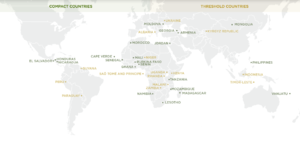Millennium Challenge Corporation
The Millennium Challenge Corporation (MCC) is a bilateral United States foreign aid agency established by the U.S. Congress in 2004.[4] Other development programs like USAID have been thought to suffer from many different and sometimes conflicting goals, which often are a result of political pressures, and for not delivering long-term economic improvements.Its guiding principles are: The first CEO of the Millennium Challenge Corporation was Paul V. Applegarth, a finance manager with experience in emerging markets.[citation needed] The indicators are:[20] Centre for Law and Democracy Access Now An eligible country must apply for a grant with a specific project in mind.If the country scores poorly but has a positive, upward trend on the selection criteria, it can still be eligible for a smaller grant, called a threshold program.MCC requires that each partner government creates a special purpose legal entity that will be accountable for implementing the compact program.In the first year (2004), 17 countries were made eligible for an MCC grant: Armenia, Benin, Bolivia, Cape Verde, El Salvador, Georgia, Ghana, Honduras, Lesotho, Madagascar, Mali, Mongolia, Morocco, Mozambique, Nicaragua, Senegal, Sri Lanka, and Vanuatu.[57] Again for fiscal year 2008, less funding will be provided than was hoped for, and only $1.2 billion was budgeted; the CEO of the MCC commented that it would undercut the program's efforts.[59] Senator Richard Lugar, the author of the amendment, responded that more "realistic" funding levels allowed for more compacts, thus spreading the "MCC effect".[62] Studies by conservative groups such as The Heritage Foundation in the United States have shown that many developing countries that have received foreign aid have seen their per capita income fall or stagnate over the last 40 years.[66] The World Policy Council, headed by Ambassador Horace Dawson and Senator Edward Brooke, recognizes the MCC as the most recent and most promising program in its area, and recommended that the Bush administration and the Congressional Black Caucus focus on full funding and an accelerated pace of spending.[80][79] Some find that these relationships are independent of growth, with lower poverty rates in countries that have passed the MCC scorecard than those that fail it, even holding GDP constant.[79] Some critics have charged that the program uses indicators by conservative groups, such as The Heritage Foundation, and is therefore biased toward free market economics and reimposing American imperialism on the Global South.[90][91][92] A similar disinformation effort attributed to the Chinese government was attempted against MCC's program in Nepal, but was ultimately unsuccessful and the compact moved forward.

Washington, D.C.Alice P. AlbrightbilateralUnited States foreign aidU.S. CongressState DepartmentInter-American Development BankGeorge W. BushPaul V. Applegarthemerging marketsJohn DanilovichU.S. Ambassador to Costa RicaU.S. Ambassador to BrazilDaniel W. YohannesSean CairncrossTrump administrationMahmoud Bahpresident of the United StatesUnited States Senateex officioU.S. Secretary of StateU.S. Secretary of the TreasuryAdministrator of the United States Agency for International DevelopmentU.S. Trade RepresentativeAntony BlinkenJanet YellenSamantha PowerKatherine TaiAnder Crenshaweconomic growthfree marketscorruptionCivil libertiesFreedom HousePolitical rightsFreedom of InformationReporters Without BordersCentre for Law and DemocracyAccess NowGovernment effectivenessRule of lawControl of corruptionImmunizationWorld Health OrganizationPublic expenditure on healthprimary educationsecondary educationUNESCOeducationNatural resource protectionChild HealthInflation rateInternational Monetary FundTrade policyThe Heritage FoundationLand rightsaccessV-Dem InstituteRegulatoryFiscal policyAccess to CreditWorld BankGender in the EconomyEmployment OpportunityArmeniaBurkina FasoCabo VerdeCôte d'IvoireEl SalvadorGeorgiaHondurasIndonesiaJordanKosovoLesothoLiberiaMadagascarMalawiMoldovaMongoliaMoroccoMozambiqueNamibiaNicaraguaPhilippinesSenegalSri LankaTanzaniaTimor LesteTunisiaVanuatuZambiaAlbaniaEthiopiaGuatemalaGuyanaGambiaKyrgyz RepublicParaguayRwandaSão Tomé and PríncipeSolomon IslandsUgandaUkraineBoliviaCape Verdethe GambiaMauritaniaSwazilandCongressfiscal yearRichard LugarIndex of Economic FreedomUnited States Government Accountability OfficeProgram Assessment Rating ToolWorld Policy CouncilAmbassadorHorace DawsonSenatorEdward BrookeCongressional Black CaucusAmerican imperialismGlobal SouthCabinet of Sri LankaConstitution of Sri LankaMillennium Challenge Corporation’s Nepal Compact